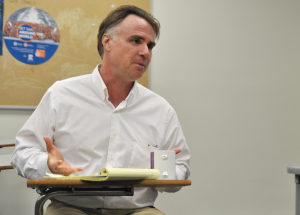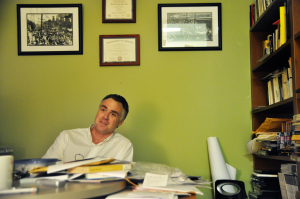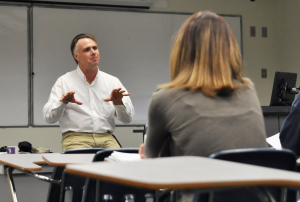
James Tracy made his way to the front of his classroom of about 30 students and placed his hands on the desk before him. He looked to his students, smile wide. “My name is James Tracy,” he said. “You may have heard of me.”
“So you’re the big man on campus?” teased Charity Munger, junior multimedia journalism major, leaning forward in her chair in the front. Tracy laughed.
It was the first Public Opinion and Modernity class of the semester. For many of his students, it was their first time meeting Tracy, but certainly not their first time hearing about him.
Tracy, who has been an associate professor in the communications department since 2002, sparked controversy throughout the nation these past few weeks when he wrote “The Sandy Hook Massacre: Unanswered Questions and Missing Information” on Dec. 24 on his personal blog, memoryholeblog.com. His post discusses inconsistencies in the reporting of the massacre in Newtown, Conn. on Dec. 14 — the medical examiner’s inability to answer questions, the nature of the gunshots, lack of photo or video surveillance from that day — that lead him to believe the events of that day didn’t unfold as they presented it.
[quote_simple]“While it sounds like an outrageous claim, one is left to inquire whether the Sandy Hook shooting ever took place—at least in the way law enforcement authorities and the nation’s news media have described,” Tracy’s blog reads.[/quote_simple]
The volume of people that Google searched “James Tracy” since that day has skyrocketed to over 25 times as many searches, according to Google Trends.
Hashtags like #JamesTracy and #FAUProfessor have been attached to scrutinizing tweets about the controversy. He’s received over 600 comments on the blog post, whereas previous posts received as little as six to no comments. And then over 800 news sources reported on his claims about the Newtown shooting.
Since the notorious Sandy Hook blog post was written, Tracy has been thrust into the public’s eye.
But the Sandy Hook conspiracy isn’t the first theory of Tracy’s and it won’t be his last.
[divider type=”thin”]
[title type=”h2″]Inside his mind[/title]
Tracy flipped through the pages of a biography of Malcolm X in an African-American history class.
He was 29 at the time and an undergraduate at San Jose State University.

“I was fascinated by it. It was one of the best books I’ve ever read,” Tracy said. “That’s actually one of the first kind of conspiracies I looked at. I think that he was regarded as being a nuisance to say the least by the establishment. I think that he was likely killed as a result of it.”
After that, he began looking critically into media coverage of major events such as the assassination of Malcolm X. And he didn’t stop there.
Throughout graduate school at Iowa State, Tracy explored a controversial shot in history — the death of JFK.
“[The assassination of John F. Kennedy] seemed unusual — the circumstances,” Tracy said. “Probably coordination between the mafia and the intelligence community.”
Tracy presented a range of theories about events like 9/11, the assassination of Martin Luther King Jr., and even a theory on why he questions everything in the first place.
“I think that there’s something about being Irish, where people are paranoid,” Tracy said. “We experience oppression by our forebears that actually pass down to [us] genetically: that sense, that awareness. I think that’s the case with the Irish.”
But Tracy’s not troubled by people criticizing his conspiratorial thoughts.
“What if I told you that the government was involved in these mass shootings? Maybe they are, maybe they’re not. You can say, ‘Well, you’re a conspiracy theorist. This is nonsense,’” Tracy said. “If you’re calling me a conspiracy theorist, then you don’t have to worry about what I’m saying. Because I’m nuts.”
[divider type=”thin”]
[title type=”h2″]The man the media made[/title]
Two weeks following the initial blog post, the Sun Sentinel released a story on Tracy’s blog post — it was the first of many.
“FAU prof stirs controversy by disputing Newtown massacre,” the headline read.

“I think that some of the stories are spun in a certain way, because I spoke with the Sun Sentinel reporter for over an hour, yet it’s a very brief article. We talked about an awful lot, yet it didn’t come out in that way,” said Tracy.
The following day, The Huffington Post re-ran the same story. Since then, the story of the conspiracy professor who believed Newtown never happened blew up to a national scale.
“You have these big media outlets that are interested in the human interest element of my remarks, eventually causing hurt to the Newtown family members,” Tracy said, about the media coverage of the controversy. “It became less to do with my critique of the media and more to do with this human interest element.”
Outlets like Fox News, CNN, and MSNBC among many others have since reported this issue.
Along with the constant news coverage came public scrutiny of Tracy and position at FAU. Some local news outlets have suggested that Tracy be removed from his position immediately.
“And while I am a great fan of academic freedom, I also recognize that professors shape the way our kids think. And if their work amounts to second-rate thought and paranoid rantism, they should go.” said Chuck Strouse, Broward Palm Beach New Times.
In Newtown, First Selectman E. Patricia Llodra publicly condemned FAU for continuing to employ Tracy after the remarks.
“Shame on you, too, FAU, to even have someone like this on your payroll,” Llodra told FoxNews.com.
“Professor Tracy is an embarrassment to me as an educator, and should be to you as well.”
Chris Robé, president of the university’s faculty union — the position that Tracy formerly held — believes this is a matter of free speech.
“You have to respect peoples’ right to free speech,” Robé said. “It’s easy to agree with free speech when everyone agrees with what’s being said. It’s when everyone disagrees that it gets complicated.”
But FAU distanced themselves from Tracy and his blog following the media frenzy.
“I want to make it clear that those views and opinions are not shared by Florida Atlantic University,” read a release from University President Mary Jane Saunders. “I am personally saddened by any media stories that have added to the pain felt by the victims’ families.”
[divider type=”thin”]
[title type=”h2″]The aftermath[/title]
Tracy sat solemnly in his office last Tuesday night, about a week since the first article was released. We talked about class, we talked about conspiracies, but mostly about the outcome of his blog posts and the media coverage.
He found out earlier that the university allegedly launched an investigation of him.
“They’re getting people calling them saying that this person shouldn’t be teaching. He’s an awful person and what have you,” he said.

“[My wife] thinks that the publicity is really undue. In a way, I’m a symbol of something that’s much larger, which is the contradictory statements and acts of our government. When someone holds up a red flag, so to speak, and questions that, then there’s great cause for concern.”
Tracy’s wife, an FAU librarian, refused to comment.
FAU refused to confirm or comment on the investigation, according to Media Relations Director Lisa Metcalf, citing it as a “personnel matter.”
Chris Robé recognizes the university’s right to investigate Tracy, but could not confirm the investigation.
He also recognizes that this is a matter of free speech.
“Every faculty member has the right to say whatever they want outside of the university as a citizen,” Robé said. “How would you feel if you lost your job because of something you wrote on your personal blog?”
According to Tracy, the action is just investigatory at this point, as opposed to disciplinary.
“Disciplinary would be, ‘Here’s what we’re going to do.’ I don’t know if that would involve stripping me of my tenure and dismissing me, or what,” he said.
Tracy said he understands the university’s position on the matter, regardless of his uncertainty about job status.
“There might be donors, from what I’ve heard, that might be second guessing collaborating and donating things,” he said. “They also have to be concerned with the money coming in. There’s been a lot of publicity, but I’m sure they likely believe that it’s not positive.”
He may not know much about the investigation, but he does know one thing.
“If they intend to fire me, ultimately, how good of an institution is it?” he said. “If they’re not going to stand up for free speech and ideas and things of the like, then I’m not too sure I want to be here either.”
[Ryan Cortes contributed to the reporting of this story.]




















